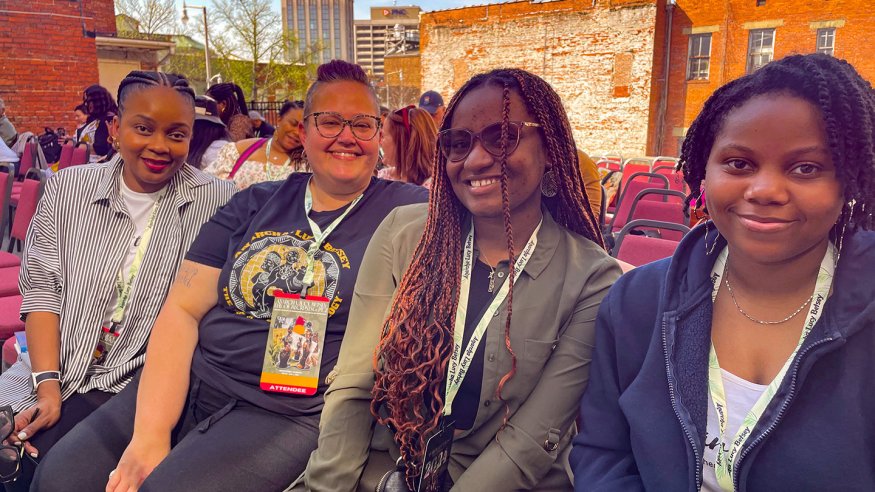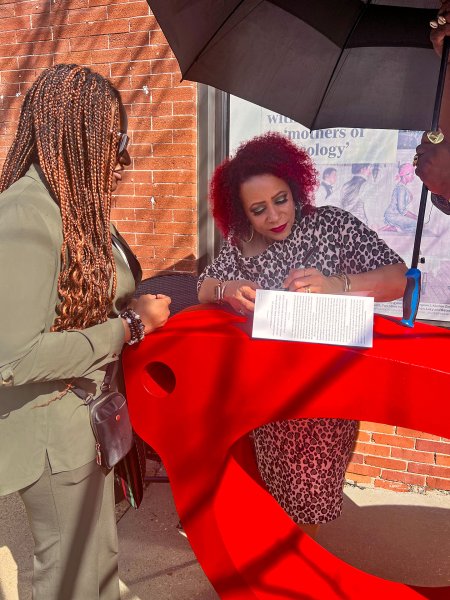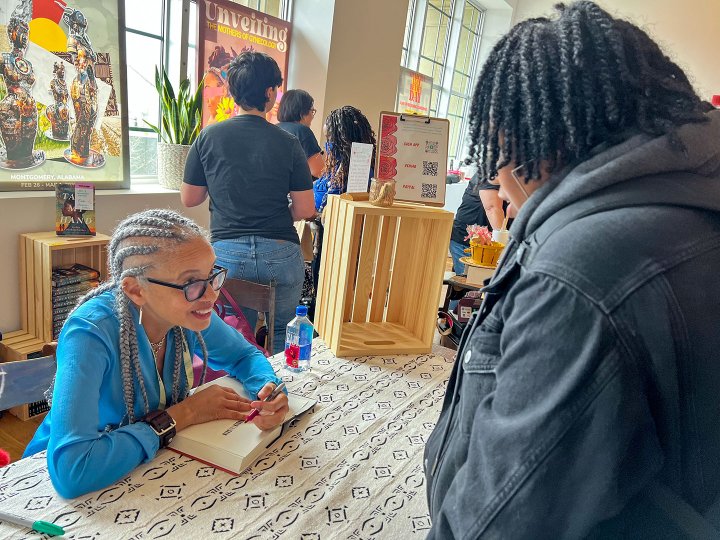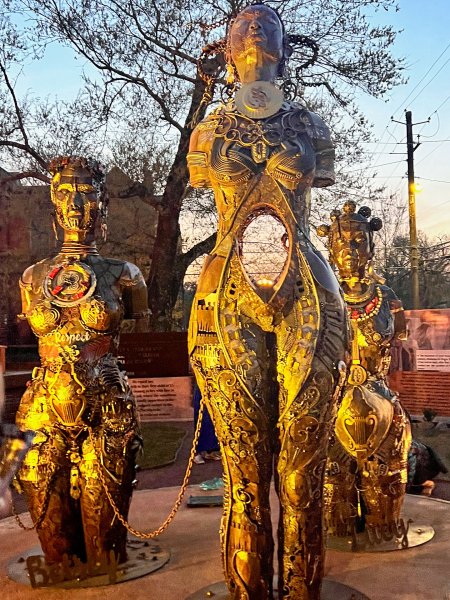
‘Day of Reckoning’
Ohio Wesleyan Students, Faculty Attend Conference Focusing on Black Women's Healthcare Issues

Name: Jemimah Chukwuemeka ’26
Hometown: Ikoyi, Lagos State, Nigeria
Majors: Biochemistry and Pre-Medicine
Minors: Communication and French
High School: Albesta Academy
Name: Anya Robinson ’26
Hometown: Belleville, Illinois
Majors: Neuroscience and French
Minor: Black World Studies
High School: Belleville West High School
OWU Connection Experience: Attending the four-day Anarcha, Lucy, Betsey Day of Reckoning Conference in Montgomery, Alabama, with support from a competitive, Ohio Wesleyan-funded Diversity, Equity, and Inclusion Grant
The second annual Day of Reckoning Conference examined historic inequities in Black women’s healthcare, including maternal care. The event was inspired by the legacies of three enslaved women – Anarcha, Lucy, and Betsey – who underwent painful gynecological surgeries without their consent in the mid-1800s.
The students traveled with OWU faculty members Dawn Chisebe, chief diversity officer and part-time professor of Africana, Gender, and Identity Studies, and Phokeng Dailey, Ph.D., department chair and associate professor of Communication.
Chukwuemeka and Robinson will discuss the conference and its impact during an April 17 campus event.
Most Unforgettable Moments

Robinson: “Seeing and talking together about the history of racism in Montgomery at places like Martin Luther King’s house, the place where Rosa Parks refused to get up and move, and then realizing how recent in history all of these events are to now. Second to that were the sculptures of the enslaved people in The Legacy Museum.”
Chukwuemeka: “The most unforgettable/eye-opening experience was when we visited the Legacy Museum. It is in Montgomery, where Black people were once made to work as slaves. The Legacy Museum is just a few meters from the rail station where tens of thousands of Black people were sold throughout the 19th century, one of the most notorious slave auction locations in America. …
“The museum does a fantastic job of portraying African American history, from the slave trade to Jim Crow to mass incarceration. I have no words to describe the emotions I had while touring this museum – I was overcome. ‘How many jellybeans are in this jar?’ was a demonstration of the voting test Blacks had to pass. ‘What number of stars are seen in the sky?’ Seriously. They obviously failed.
“Over 800 jars of dirt from various American lynching sites have been gathered as part of the Community Remembrance Project. ... Outside the museum, there is a memorial for lynching victims.”
Most Empowering Experiences

Robinson: “Learning about the changes that so many people are encouraged to engage in. Seeing what my ancestors fought for and the tenacity and resilience that they had for me to even exist today. Seeing the fight for freedom in the past inspires me to fight for Black rights in the future.
“Professor Chisebe, Dr. Dailey, and Jemimah all had different perceptions and knowledge on Black culture, history and what is happening currently in healthcare, which gives me hope that people are working on creating positive changes that will directly impact Black people while deconstructing the ways that Black people are seen as a monolith.”
Chukwuemeka: “The event’s host, activist and artist Michelle Browder, has worked hard to reclaim the history of the enslaved Black women who were subjected to non-anesthetized medical experimentation by Dr. James Marion Sims in the late 1840s in Montgomery, Alabama. After visiting the Mothers of Gynecology Monument, I can say that it is undoubtedly an exceptionally beautiful sculpture with a significance attached to everything.
“For example, the fact that the bodies and womb are built from abandoned metal components alludes to the terrible treatment of the women by Dr. Sims and other white people who supported slavery. However, the women’s poses, hairstyles, and ornaments serve to affirm their identities and honor the strength and tenacity of Black women.
“Although she may not work in the medical area, everything (Browder) does demonstrates to me that you do not have to be a doctor to make a difference. By using your strengths to carry out actions that will have a beneficial effect, you may start bringing about change. …”
Lessons Learned
Robinson: “I am more aware of the biases and racism that exist within science, research, and medicine and the impact that has on the lived reality of Black women, which are all fields I am interested in; so, as I do research in the future, I will make sure to include Black people within the research and make sure the technology does not have biases that cause inaccuracies within the research.
“Technology often cannot read darker skin tones accurately – an example is with pulse oximeters sensors where they did not accurately read people with darker skin tone’s oxygens levels accurately. This caused more deaths within minoritized populations in America because the oximeters overestimated the oxygen levels within people. It will make me look at research in a more open way.”
Chukwuemeka: “One thing I have gained from the conference is to remember to be among the doers, not just someone that talks. … I have learned that you do not necessarily have to be a physician to be able to see the needs of our society and produce ways to make change; we need to bear in mind that an intervention might not fix the whole problem. I can choose to be an active part of my community and do virtuous deeds or even use my talent to do things like the way Michelle Browder is using her art to speak to improve my community.”
Meaningful Mentoring
Chukwuemeka: “I would like to express my gratitude to Dr. Dailey and Professor Chisebe since without them, I would not have been able to visit any of these locations. I did not think I would have the chance to attend a conference like that in my first year. …
“They provided me with an amazing opportunity that I loved and helped us with our grant applications. They offered me recommendations for improvement in the necessary areas, expressed their opinions on our ideas, and offered guidance. By inviting me to join them at the conference, they both prodded me to break out of my shell and take part in this fantastic accomplishment. For everything they have done for me, I am appreciative.”
Plans After Graduation
Robinson: “I plan on going to get a Ph.D. in Neuroscience so that I can develop medicine and study neurodegenerative diseases such as Alzheimer’s. I am also interested in creating technology that incorporates Black people.”
Chukwuemeka: “I plan to attend medical school to advance my education. I also want to volunteer at children’s hospitals and gain more amazing research experience. ... My future end game is to become a successful pediatric neurosurgeon. My ultimate objective is to establish multiple foundations, hospitals, and clinics for women and children, especially in my home country. …
“Most female children in my home country do not receive quality education nor medical care; therefore, I want to help females understand that they are unique and deserve equal rights as their male counterparts. I have always been empathetic toward children and passionate about helping them, so I want to use the abilities I will acquire to enhance my hometown’s quality of life and that of its citizens. These are my dreams for the time being, but I hope to one day be able to be both a dreamer and a doer.”
